小学英语教研活动发言稿
- 格式:docx
- 大小:13.01 KB
- 文档页数:2
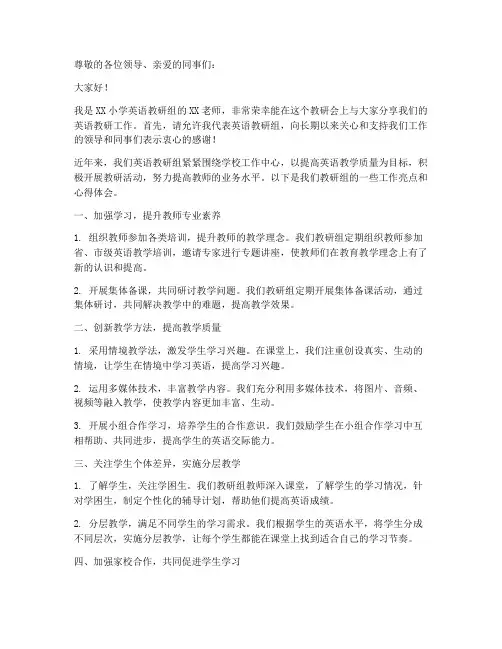
尊敬的各位领导、亲爱的同事们:大家好!我是XX小学英语教研组的XX老师,非常荣幸能在这个教研会上与大家分享我们的英语教研工作。
首先,请允许我代表英语教研组,向长期以来关心和支持我们工作的领导和同事们表示衷心的感谢!近年来,我们英语教研组紧紧围绕学校工作中心,以提高英语教学质量为目标,积极开展教研活动,努力提高教师的业务水平。
以下是我们教研组的一些工作亮点和心得体会。
一、加强学习,提升教师专业素养1. 组织教师参加各类培训,提升教师的教学理念。
我们教研组定期组织教师参加省、市级英语教学培训,邀请专家进行专题讲座,使教师们在教育教学理念上有了新的认识和提高。
2. 开展集体备课,共同研讨教学问题。
我们教研组定期开展集体备课活动,通过集体研讨,共同解决教学中的难题,提高教学效果。
二、创新教学方法,提高教学质量1. 采用情境教学法,激发学生学习兴趣。
在课堂上,我们注重创设真实、生动的情境,让学生在情境中学习英语,提高学习兴趣。
2. 运用多媒体技术,丰富教学内容。
我们充分利用多媒体技术,将图片、音频、视频等融入教学,使教学内容更加丰富、生动。
3. 开展小组合作学习,培养学生的合作意识。
我们鼓励学生在小组合作学习中互相帮助、共同进步,提高学生的英语交际能力。
三、关注学生个体差异,实施分层教学1. 了解学生,关注学困生。
我们教研组教师深入课堂,了解学生的学习情况,针对学困生,制定个性化的辅导计划,帮助他们提高英语成绩。
2. 分层教学,满足不同学生的学习需求。
我们根据学生的英语水平,将学生分成不同层次,实施分层教学,让每个学生都能在课堂上找到适合自己的学习节奏。
四、加强家校合作,共同促进学生学习1. 定期召开家长会,向家长介绍英语教学情况和学生的进步,让家长了解孩子在学校的英语学习情况。
2. 建立家校沟通平台,方便家长与教师沟通交流,共同关注学生的英语学习。
总之,我们英语教研组将继续努力,不断提高教学质量,为学校英语教育事业的蓬勃发展贡献力量。
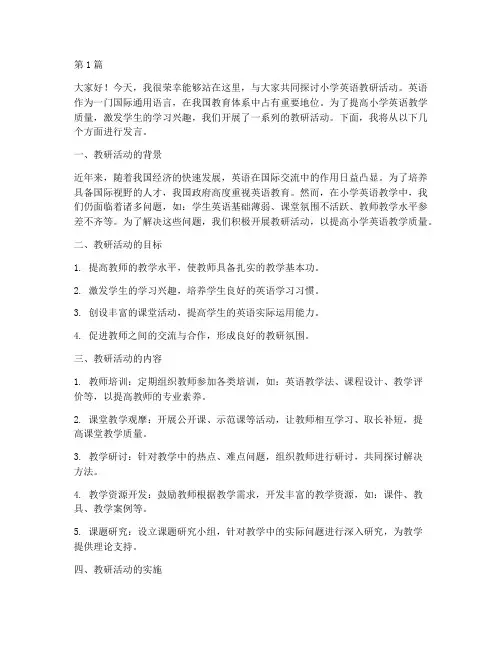
第1篇大家好!今天,我很荣幸能够站在这里,与大家共同探讨小学英语教研活动。
英语作为一门国际通用语言,在我国教育体系中占有重要地位。
为了提高小学英语教学质量,激发学生的学习兴趣,我们开展了一系列的教研活动。
下面,我将从以下几个方面进行发言。
一、教研活动的背景近年来,随着我国经济的快速发展,英语在国际交流中的作用日益凸显。
为了培养具备国际视野的人才,我国政府高度重视英语教育。
然而,在小学英语教学中,我们仍面临着诸多问题,如:学生英语基础薄弱、课堂氛围不活跃、教师教学水平参差不齐等。
为了解决这些问题,我们积极开展教研活动,以提高小学英语教学质量。
二、教研活动的目标1. 提高教师的教学水平,使教师具备扎实的教学基本功。
2. 激发学生的学习兴趣,培养学生良好的英语学习习惯。
3. 创设丰富的课堂活动,提高学生的英语实际运用能力。
4. 促进教师之间的交流与合作,形成良好的教研氛围。
三、教研活动的内容1. 教师培训:定期组织教师参加各类培训,如:英语教学法、课程设计、教学评价等,以提高教师的专业素养。
2. 课堂教学观摩:开展公开课、示范课等活动,让教师相互学习、取长补短,提高课堂教学质量。
3. 教学研讨:针对教学中的热点、难点问题,组织教师进行研讨,共同探讨解决方法。
4. 教学资源开发:鼓励教师根据教学需求,开发丰富的教学资源,如:课件、教具、教学案例等。
5. 课题研究:设立课题研究小组,针对教学中的实际问题进行深入研究,为教学提供理论支持。
四、教研活动的实施1. 制定详细的教研活动计划,明确活动时间、地点、内容等。
2. 组织教师积极参与教研活动,确保活动顺利进行。
3. 邀请专家、学者进行专题讲座,为教师提供学术支持。
4. 建立教研活动档案,对活动过程进行记录、总结。
5. 定期对教研活动进行评估,不断改进活动内容和方法。
五、教研活动的成果1. 教师的教学水平得到显著提高,课堂教学质量明显提升。
2. 学生的英语学习兴趣得到激发,学习效果显著。
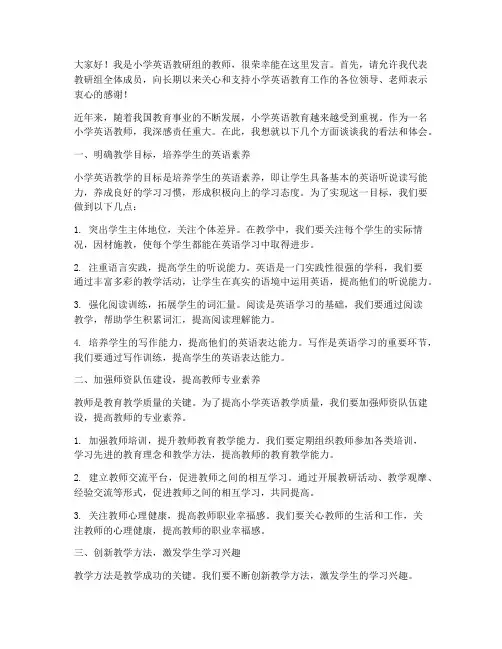
大家好!我是小学英语教研组的教师,很荣幸能在这里发言。
首先,请允许我代表教研组全体成员,向长期以来关心和支持小学英语教育工作的各位领导、老师表示衷心的感谢!近年来,随着我国教育事业的不断发展,小学英语教育越来越受到重视。
作为一名小学英语教师,我深感责任重大。
在此,我想就以下几个方面谈谈我的看法和体会。
一、明确教学目标,培养学生的英语素养小学英语教学的目标是培养学生的英语素养,即让学生具备基本的英语听说读写能力,养成良好的学习习惯,形成积极向上的学习态度。
为了实现这一目标,我们要做到以下几点:1. 突出学生主体地位,关注个体差异。
在教学中,我们要关注每个学生的实际情况,因材施教,使每个学生都能在英语学习中取得进步。
2. 注重语言实践,提高学生的听说能力。
英语是一门实践性很强的学科,我们要通过丰富多彩的教学活动,让学生在真实的语境中运用英语,提高他们的听说能力。
3. 强化阅读训练,拓展学生的词汇量。
阅读是英语学习的基础,我们要通过阅读教学,帮助学生积累词汇,提高阅读理解能力。
4. 培养学生的写作能力,提高他们的英语表达能力。
写作是英语学习的重要环节,我们要通过写作训练,提高学生的英语表达能力。
二、加强师资队伍建设,提高教师专业素养教师是教育教学质量的关键。
为了提高小学英语教学质量,我们要加强师资队伍建设,提高教师的专业素养。
1. 加强教师培训,提升教师教育教学能力。
我们要定期组织教师参加各类培训,学习先进的教育理念和教学方法,提高教师的教育教学能力。
2. 建立教师交流平台,促进教师之间的相互学习。
通过开展教研活动、教学观摩、经验交流等形式,促进教师之间的相互学习,共同提高。
3. 关注教师心理健康,提高教师职业幸福感。
我们要关心教师的生活和工作,关注教师的心理健康,提高教师的职业幸福感。
三、创新教学方法,激发学生学习兴趣教学方法是教学成功的关键。
我们要不断创新教学方法,激发学生的学习兴趣。
1. 利用多媒体技术,丰富教学内容。
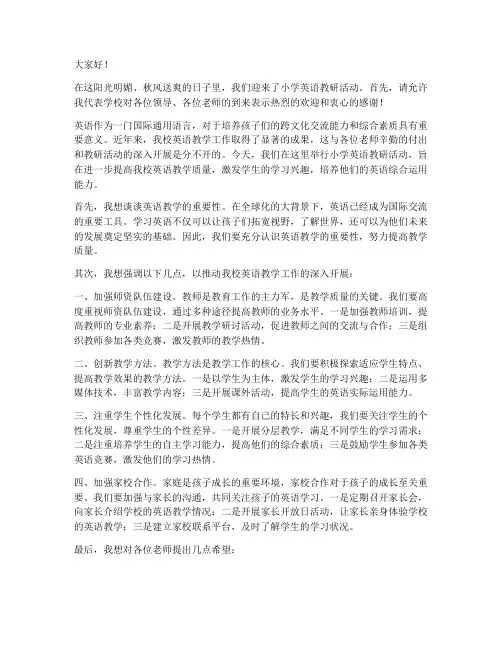
大家好!在这阳光明媚、秋风送爽的日子里,我们迎来了小学英语教研活动。
首先,请允许我代表学校对各位领导、各位老师的到来表示热烈的欢迎和衷心的感谢!英语作为一门国际通用语言,对于培养孩子们的跨文化交流能力和综合素质具有重要意义。
近年来,我校英语教学工作取得了显著的成果,这与各位老师辛勤的付出和教研活动的深入开展是分不开的。
今天,我们在这里举行小学英语教研活动,旨在进一步提高我校英语教学质量,激发学生的学习兴趣,培养他们的英语综合运用能力。
首先,我想谈谈英语教学的重要性。
在全球化的大背景下,英语已经成为国际交流的重要工具。
学习英语不仅可以让孩子们拓宽视野,了解世界,还可以为他们未来的发展奠定坚实的基础。
因此,我们要充分认识英语教学的重要性,努力提高教学质量。
其次,我想强调以下几点,以推动我校英语教学工作的深入开展:一、加强师资队伍建设。
教师是教育工作的主力军,是教学质量的关键。
我们要高度重视师资队伍建设,通过多种途径提高教师的业务水平。
一是加强教师培训,提高教师的专业素养;二是开展教学研讨活动,促进教师之间的交流与合作;三是组织教师参加各类竞赛,激发教师的教学热情。
二、创新教学方法。
教学方法是教学工作的核心。
我们要积极探索适应学生特点、提高教学效果的教学方法。
一是以学生为主体,激发学生的学习兴趣;二是运用多媒体技术,丰富教学内容;三是开展课外活动,提高学生的英语实际运用能力。
三、注重学生个性化发展。
每个学生都有自己的特长和兴趣,我们要关注学生的个性化发展,尊重学生的个性差异。
一是开展分层教学,满足不同学生的学习需求;二是注重培养学生的自主学习能力,提高他们的综合素质;三是鼓励学生参加各类英语竞赛,激发他们的学习热情。
四、加强家校合作。
家庭是孩子成长的重要环境,家校合作对于孩子的成长至关重要。
我们要加强与家长的沟通,共同关注孩子的英语学习。
一是定期召开家长会,向家长介绍学校的英语教学情况;二是开展家长开放日活动,让家长亲身体验学校的英语教学;三是建立家校联系平台,及时了解学生的学习状况。
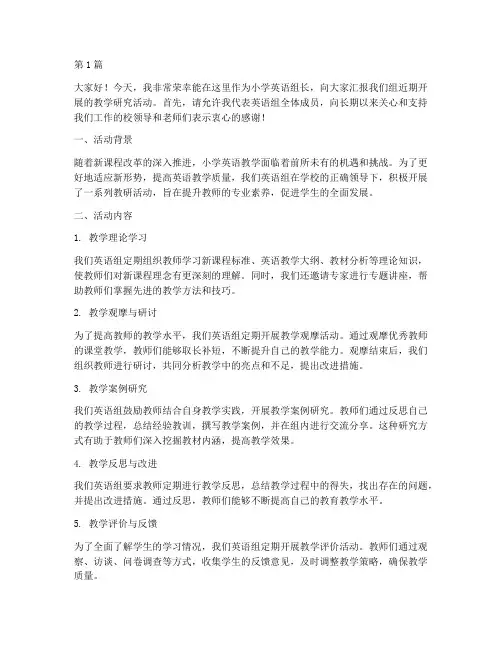
第1篇大家好!今天,我非常荣幸能在这里作为小学英语组长,向大家汇报我们组近期开展的教学研究活动。
首先,请允许我代表英语组全体成员,向长期以来关心和支持我们工作的校领导和老师们表示衷心的感谢!一、活动背景随着新课程改革的深入推进,小学英语教学面临着前所未有的机遇和挑战。
为了更好地适应新形势,提高英语教学质量,我们英语组在学校的正确领导下,积极开展了一系列教研活动,旨在提升教师的专业素养,促进学生的全面发展。
二、活动内容1. 教学理论学习我们英语组定期组织教师学习新课程标准、英语教学大纲、教材分析等理论知识,使教师们对新课程理念有更深刻的理解。
同时,我们还邀请专家进行专题讲座,帮助教师们掌握先进的教学方法和技巧。
2. 教学观摩与研讨为了提高教师的教学水平,我们英语组定期开展教学观摩活动。
通过观摩优秀教师的课堂教学,教师们能够取长补短,不断提升自己的教学能力。
观摩结束后,我们组织教师进行研讨,共同分析教学中的亮点和不足,提出改进措施。
3. 教学案例研究我们英语组鼓励教师结合自身教学实践,开展教学案例研究。
教师们通过反思自己的教学过程,总结经验教训,撰写教学案例,并在组内进行交流分享。
这种研究方式有助于教师们深入挖掘教材内涵,提高教学效果。
4. 教学反思与改进我们英语组要求教师定期进行教学反思,总结教学过程中的得失,找出存在的问题,并提出改进措施。
通过反思,教师们能够不断提高自己的教育教学水平。
5. 教学评价与反馈为了全面了解学生的学习情况,我们英语组定期开展教学评价活动。
教师们通过观察、访谈、问卷调查等方式,收集学生的反馈意见,及时调整教学策略,确保教学质量。
三、活动成果1. 教师队伍素质得到提升通过开展一系列教研活动,我们英语组教师的业务水平得到了显著提高。
教师们在教学理论、教学方法、教学技巧等方面都有了新的收获,为提高教学质量奠定了坚实基础。
2. 学生英语水平得到提高在教师们的共同努力下,学生的英语水平得到了显著提高。
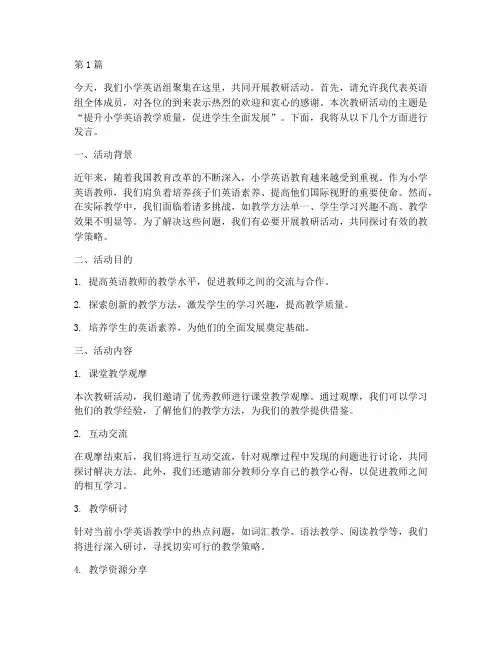
第1篇今天,我们小学英语组聚集在这里,共同开展教研活动。
首先,请允许我代表英语组全体成员,对各位的到来表示热烈的欢迎和衷心的感谢。
本次教研活动的主题是“提升小学英语教学质量,促进学生全面发展”。
下面,我将从以下几个方面进行发言。
一、活动背景近年来,随着我国教育改革的不断深入,小学英语教育越来越受到重视。
作为小学英语教师,我们肩负着培养孩子们英语素养、提高他们国际视野的重要使命。
然而,在实际教学中,我们面临着诸多挑战,如教学方法单一、学生学习兴趣不高、教学效果不明显等。
为了解决这些问题,我们有必要开展教研活动,共同探讨有效的教学策略。
二、活动目的1. 提高英语教师的教学水平,促进教师之间的交流与合作。
2. 探索创新的教学方法,激发学生的学习兴趣,提高教学质量。
3. 培养学生的英语素养,为他们的全面发展奠定基础。
三、活动内容1. 课堂教学观摩本次教研活动,我们邀请了优秀教师进行课堂教学观摩。
通过观摩,我们可以学习他们的教学经验,了解他们的教学方法,为我们的教学提供借鉴。
2. 互动交流在观摩结束后,我们将进行互动交流,针对观摩过程中发现的问题进行讨论,共同探讨解决方法。
此外,我们还邀请部分教师分享自己的教学心得,以促进教师之间的相互学习。
3. 教学研讨针对当前小学英语教学中的热点问题,如词汇教学、语法教学、阅读教学等,我们将进行深入研讨,寻找切实可行的教学策略。
4. 教学资源分享为了丰富教学内容,提高教学效果,我们将分享一些优秀的教学资源,如课件、教案、教学视频等,供大家参考。
四、活动总结1. 总结本次教研活动的收获,肯定教师在活动中的表现。
2. 分析存在的问题,提出改进措施。
3. 鼓励教师在今后的教学中,继续努力,不断提高自身素质。
五、展望未来通过本次教研活动,我们相信,小学英语教师的教学水平将得到进一步提高,学生的学习兴趣将得到充分激发,教学质量将得到明显改善。
在今后的工作中,我们将继续努力,为我国小学英语教育事业的发展贡献自己的力量。
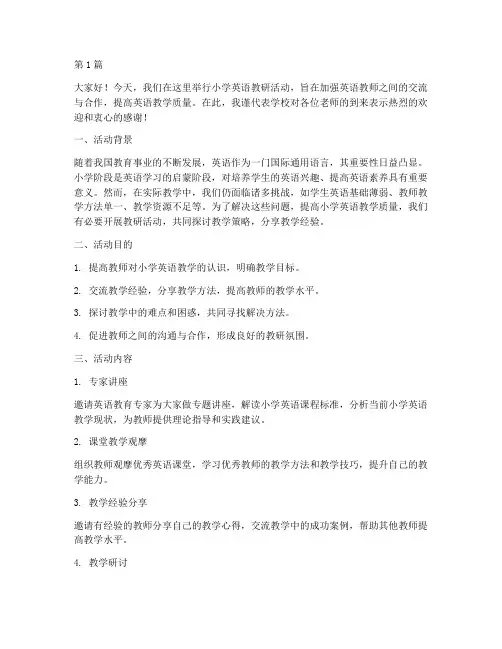
第1篇大家好!今天,我们在这里举行小学英语教研活动,旨在加强英语教师之间的交流与合作,提高英语教学质量。
在此,我谨代表学校对各位老师的到来表示热烈的欢迎和衷心的感谢!一、活动背景随着我国教育事业的不断发展,英语作为一门国际通用语言,其重要性日益凸显。
小学阶段是英语学习的启蒙阶段,对培养学生的英语兴趣、提高英语素养具有重要意义。
然而,在实际教学中,我们仍面临诸多挑战,如学生英语基础薄弱、教师教学方法单一、教学资源不足等。
为了解决这些问题,提高小学英语教学质量,我们有必要开展教研活动,共同探讨教学策略,分享教学经验。
二、活动目的1. 提高教师对小学英语教学的认识,明确教学目标。
2. 交流教学经验,分享教学方法,提高教师的教学水平。
3. 探讨教学中的难点和困惑,共同寻找解决方法。
4. 促进教师之间的沟通与合作,形成良好的教研氛围。
三、活动内容1. 专家讲座邀请英语教育专家为大家做专题讲座,解读小学英语课程标准,分析当前小学英语教学现状,为教师提供理论指导和实践建议。
2. 课堂教学观摩组织教师观摩优秀英语课堂,学习优秀教师的教学方法和教学技巧,提升自己的教学能力。
3. 教学经验分享邀请有经验的教师分享自己的教学心得,交流教学中的成功案例,帮助其他教师提高教学水平。
4. 教学研讨围绕教学中的热点问题进行研讨,如如何激发学生学习兴趣、如何提高学生口语表达能力、如何有效利用教学资源等。
5. 教学反思教师结合自己的教学实践,进行教学反思,总结经验教训,为今后的教学提供借鉴。
四、活动要求1. 全体教师要高度重视本次教研活动,积极参与,认真聆听。
2. 活动期间,要保持良好的会风,遵守纪律,不迟到、不早退。
3. 教师要结合自己的教学实际,认真思考,积极发言。
4. 活动结束后,要总结经验,撰写心得体会,以便在今后的教学中不断改进。
五、结语小学英语教研活动是提高教师教学水平、促进教学质量的重要途径。
希望通过本次教研活动,各位老师能够有所收获,为我国小学英语教育事业贡献自己的力量。
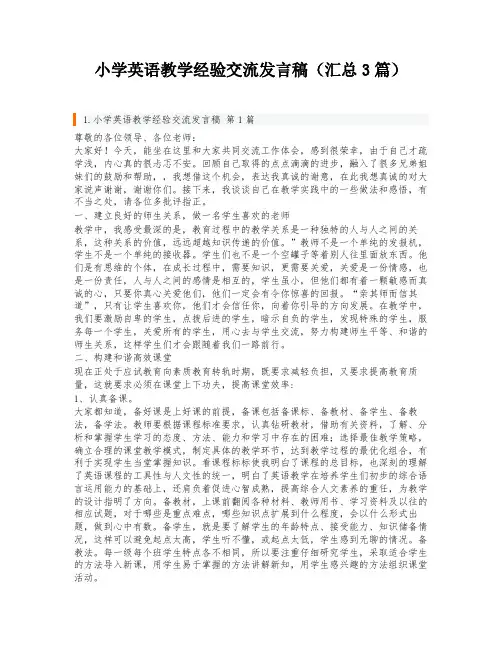
小学英语教学经验交流发言稿(汇总3篇)1.小学英语教学经验交流发言稿第1篇尊敬的各位领导、各位老师:大家好!今天,能坐在这里和大家共同交流工作体会,感到很荣幸,由于自己才疏学浅,内心真的很忐忑不安。
回顾自己取得的点点滴滴的进步,融入了很多兄弟姐妹们的鼓励和帮助,,我想借这个机会,表达我真诚的谢意,在此我想真诚的对大家说声谢谢,谢谢你们。
接下来,我谈谈自己在教学实践中的一些做法和感悟,有不当之处,请各位多批评指正。
一、建立良好的师生关系,做一名学生喜欢的老师教学中,我感受最深的是,教育过程中的教学关系是一种独特的人与人之间的关系,这种关系的价值,远远超越知识传递的价值。
”教师不是一个单纯的发报机,学生不是一个单纯的接收器。
学生们也不是一个空罐子等着别人往里面放东西。
他们是有思维的个体,在成长过程中,需要知识,更需要关爱,关爱是一份情感,也是一份责任,人与人之间的感情是相互的,学生虽小,但他们都有着一颗敏感而真诚的心,只要你真心关爱他们,他们一定会有令你惊喜的回报。
“亲其师而信其道”,只有让学生喜欢你,他们才会信任你,向着你引导的方向发展。
在教学中,我们要激励自卑的学生,点拨后进的学生,暗示自负的学生,发现特殊的学生,服务每一个学生,关爱所有的学生,用心去与学生交流,努力构建师生平等、和谐的师生关系,这样学生们才会跟随着我们一路前行。
二、构建和谐高效课堂现在正处于应试教育向素质教育转轨时期,既要求减轻负担,又要求提高教育质量,这就要求必须在课堂上下功夫,提高课堂效率:1、认真备课。
大家都知道,备好课是上好课的前提,备课包括备课标、备教材、备学生、备教法,备学法。
教师要根据课程标准要求,认真钻研教材,借助有关资料,了解、分析和掌握学生学习的态度、方法、能力和学习中存在的困难;选择最佳教学策略,确立合理的课堂教学模式,制定具体的教学环节,达到教学过程的最优化组合,有利于实现学生当堂掌握知识。
看课程标标使我明白了课程的总目标,也深刻的理解了英语课程的工具性与人文性的统一,明白了英语教学在培养学生们初步的综合语言运用能力的基础上,还肩负着促进心智成熟,提高综合人文素养的重任,为教学的设计指明了方向。

小学英语研讨发言稿【篇一:小学英语研讨会发言稿】英语研讨会交流材料发言稿张静雅尊敬的各位领导,老师们:大家下午好!今天能在这里和大家共同交流工作体会,我感到万分荣幸。
如果有什么不恰当之处,敬请各位领导前辈和同事们进行指正。
英语教学要在课堂上利用听,说,做,唱,玩等各种学习方式,培养学生学习英语的兴趣和爱好,掌握语言交流的技能。
所以我和同事们经常会提到我们农村小学英语挺难教的,确实如此,它是一门语言的学习,而这门语言却没有基本环境的支撑。
学生英语语言的输入和运用英语语言的能力的培养都靠老师在课堂上完成,因此课堂教学很重要的,除了老师自身的课堂表现力外,我觉得课堂教学的成功与否很大程度上取决于教学设计.教学设计是教学实施的基础,如果教学设计不合理的话,实施肯定也不可能成功.我们都知道一个完整的教学设计应该包括1,教学内容分析,2,学情分析,3,教学目标设计4,教学过程设计5,教学效果评价.1don’t judge a book by its cover!”深入课的内容,你会发现每个阶段的学习安排都有一定的关联性,这要靠老师提前对教学内容进行研究,三年级第二单元,let’s chant : the man is the father ,tall tall tall ,not so tall small small small one and all ,all语音是关键,而对这个语言点渗透后,学生不仅能很容易的掌握这个chant,而且也掌握了下一个单元的主要词汇small,tall.,要了解学生已有的认知经验,学习兴趣,生活经验等, 比如,我所带的四个班级学生,各有千秋, 七班的孩子相对注意力集中,对新鲜食物敏感度较高, 新颖的游戏都很能提高他们学习得热情. 六班的孩子聪明好动, 注意力相对差一些, 对新颖事物,新鲜度不高,但集体荣誉感较强,所以我多用小组竞赛的方式 . 了解了学生的兴趣,所以教学时可以以学生的兴趣为切入点,以此激发学生英语学习的热情和发展他们的综合语言运用能力. 3教学过程和教学活动都是围绕教学目标转。
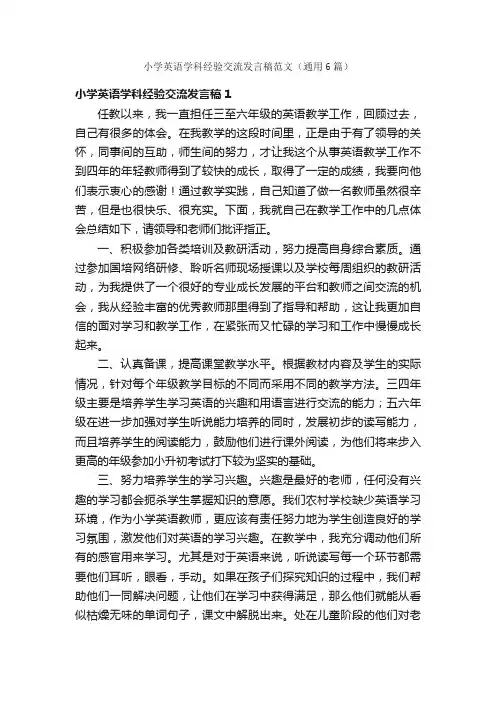
小学英语学科经验交流发言稿范文(通用6篇)小学英语学科经验交流发言稿1任教以来,我一直担任三至六年级的英语教学工作,回顾过去,自己有很多的体会。
在我教学的这段时间里,正是由于有了领导的关怀,同事间的互助,师生间的努力,才让我这个从事英语教学工作不到四年的年轻教师得到了较快的成长,取得了一定的成绩,我要向他们表示衷心的感谢!通过教学实践,自己知道了做一名教师虽然很辛苦,但是也很快乐、很充实。
下面,我就自己在教学工作中的几点体会总结如下,请领导和老师们批评指正。
一、积极参加各类培训及教研活动,努力提高自身综合素质。
通过参加国培网络研修、聆听名师现场授课以及学校每周组织的教研活动,为我提供了一个很好的专业成长发展的平台和教师之间交流的机会,我从经验丰富的优秀教师那里得到了指导和帮助,这让我更加自信的面对学习和教学工作,在紧张而又忙碌的学习和工作中慢慢成长起来。
二、认真备课,提高课堂教学水平。
根据教材内容及学生的实际情况,针对每个年级教学目标的不同而采用不同的教学方法。
三四年级主要是培养学生学习英语的兴趣和用语言进行交流的能力;五六年级在进一步加强对学生听说能力培养的同时,发展初步的读写能力,而且培养学生的阅读能力,鼓励他们进行课外阅读,为他们将来步入更高的年级参加小升初考试打下较为坚实的基础。
三、努力培养学生的学习兴趣。
兴趣是最好的老师,任何没有兴趣的学习都会扼杀学生掌握知识的意愿。
我们农村学校缺少英语学习环境,作为小学英语教师,更应该有责任努力地为学生创造良好的学习氛围,激发他们对英语的学习兴趣。
在教学中,我充分调动他们所有的感官用来学习。
尤其是对于英语来说,听说读写每一个环节都需要他们耳听,眼看,手动。
如果在孩子们探究知识的过程中,我们帮助他们一同解决问题,让他们在学习中获得满足,那么他们就能从看似枯燥无味的单词句子,课文中解脱出来。
处在儿童阶段的他们对老师的评价十分看重,如果我的处理方式不当就会增加他们的焦虑感,从而对英语学习产生了畏难情绪。
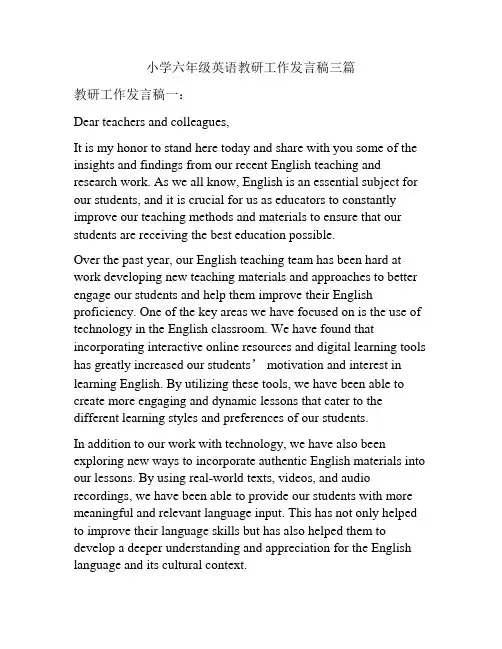
小学六年级英语教研工作发言稿三篇教研工作发言稿一:Dear teachers and colleagues,It is my honor to stand here today and share with you some of the insights and findings from our recent English teaching and research work. As we all know, English is an essential subject for our students, and it is crucial for us as educators to constantly improve our teaching methods and materials to ensure that our students are receiving the best education possible.Over the past year, our English teaching team has been hard at work developing new teaching materials and approaches to better engage our students and help them improve their English proficiency. One of the key areas we have focused on is the use of technology in the English classroom. We have found that incorporating interactive online resources and digital learning tools has greatly increased our students’ motivation and interest in learning English. By utilizing these tools, we have been able to create more engaging and dynamic lessons that cater to the different learning styles and preferences of our students.In addition to our work with technology, we have also been exploring new ways to incorporate authentic English materials into our lessons. By using real-world texts, videos, and audio recordings, we have been able to provide our students with more meaningful and relevant language input. This has not only helped to improve their language skills but has also helped them to develop a deeper understanding and appreciation for the English language and its cultural context.Furthermore, we have been working on developing more comprehensive assessment methods to better monitor our students’progress and identify areas for improvement. By implementing a variety of assessment tools, such as portfolio assessments, self-assessment, and peer assessment, we have been able to gain a more holistic view of our students’ language development and provide them with more personalized feedback and support.I am proud of the progress we have made in our English teaching and research work, and I am confident that these efforts will continue to benefit our students in the years to come. I encourageall of you to continue to explore new teaching methods and materials and to share your own insights and experiences with the rest of the team. By working together, we can ensure that our students are receiving the highest quality English education possible.Thank you for your attention, and I look forward to continuing our work together in the future.Sincerely,[Your Name]教研工作发言稿二:Good morning, everyone,I am pleased to have the opportunity to share with you some of the recent developments in our English teaching and research work. English is a fundamental subject for our students, and it is important for us as educators to continually improve our teaching methods and materials to ensure that our students are receiving the best education possible.One of the key areas we have been focusing on in our English teaching and research work is the development of more interactive and student-centered learning activities. We have found that by incorporating more group work, pair work, and project-based learning activities into our lessons, we have been able to better engage our students and provide them with more opportunities to practice and use English in authentic and meaningful ways. This has not only helped to improve their language skills but has also fostered a more positive and collaborative learning environment in our classrooms.In addition to our work with interactive learning activities, we have also been exploring new ways to integrate global issues and cross-cultural communication into our English curriculum. By incorporating topics such as environmental sustainability, social justice, and intercultural understanding into our lessons, we have been able to provide our students with a more well-rounded and relevant English education. This has not only helped to broaden our students’ perspectives and awareness of the world around them but has also helped them to develop a deeper appreciation for the value of English as a global language.Furthermore, we have been working on developing more comprehensive and meaningful assessment methods to better monitor our students’ progress and provide them with more personalized feedback and support. By implementing a variety of assessment tools, such as performance assessments, project assessments, and self-assessment, we have been able to gain a more holistic view of our students’ language development and provide them with more targeted and relevant feedback.I am proud of the progress we have made in our English teaching and research work, and I am confident that these efforts will continue to benefit our students in the years to come. I encourage all of you to continue to explore new teaching methods and materials and to share your own insights and experiences with the rest of the team. By working together, we can ensure that our students are receiving the highest quality English education possible.Thank you for your attention, and I look forward to continuing our work together in the future.Sincerely,[Your Name]教研工作发言稿三:Dear teachers and colleagues,I am delighted to have the opportunity to share with you some of the recent achievements and developments in our English teaching and research work. English is a vital subject for our students, and it is essential for us as educators to continuously improve our teaching methods and materials to ensure that our students are receiving the best education possible.Over the past year, our English teaching team has been dedicated to developing new teaching materials and approaches to better engage our students and help them improve their English proficiency. One of the key areas we have focused on is the integration of literature into our English curriculum. We have found that by incorporating more literary texts, such as short stories, poems, and novels, into our lessons, we have been able toprovide our students with more authentic and meaningful language input. This has not only helped to improve their language skills but has also fostered a greater appreciation for literature and its role in language learning and cultural understanding.In addition to our work with literature, we have also been exploring new ways to incorporate critical thinking and problem-solving skills into our English lessons. By incorporating more discussion-based activities and open-ended tasks, we have been able to challenge our students to think more critically and creatively in English. This has not only helped to improve their language skills but has also helped them to develop a more analytical and independent approach to learning.Furthermore, we have been working on developing more comprehensive assessment methods to better monitor our students’progress and provide them with more personalized feedback and support. By implementing a variety of assessment tools, such as project assessments, performance assessments, and self-assessment, we have been able to gain a more well-rounded view of our students’ language development and provide them with more relevant and targeted feedback.I am proud of the progress we have made in our English teaching and research work, and I am confident that these efforts will continue to benefit our students in the years to come. I encourageall of you to continue to explore new teaching methods and materials and to share your own insights and experiences with the rest of the team. By working together, we can ensure that our students are receiving the highest quality English education possible.Thank you for your attention, and I look forward to continuing our work together in the future.Sincerely,[Your Name]。
英语教研发言稿(精选7篇)英语教研篇1感谢你们在百忙之中能够抽出时间来参加这次英语教学研讨会。
恳请各位老师提出批评和指导。
英语教学要在课堂上利用听、说、做、唱、玩等各种学习方式,培养学生学习英语的兴趣和爱好。
教师要善于表扬和鼓励学生,让学生体验到成功的快乐。
同时。
老师们要善于设计各种场景,来提高学生的审美力,创造力,理解力,让学生学会尊重,互助,学会爱,从而提高学生的综合素质。
根据不同层次的学生活化教材,活化教学目标,活化教学过程,活化教法,活化评价方式,让每一个阶段的学生都能体验到成功的快乐。
努力让学生做到“表现欲强,自信心足,语言纯正,知识储备大。
”下面就谈谈我的一些看法:(一)、激发学生学习英语的兴趣。
兴趣是学好英语的前提,正所谓“兴趣是最好的老师”它能唤起学生的好奇心和迫切的求知欲。
因为只有“love what you do ,”才能“get what you love”.教师在教学的过程中,应该注重培养学生学习英语的兴趣。
教师可以从以下几个方面去培养:第一,教学的过程中,灵活运用各种教具,激发学生的学习欲望。
比如:运用简笔画,简笔画的特点是形象、直观、生动、活泼,能够把机械乏味的练习变成有实在意义的训练,同时增加学习的趣味性,达到事半功倍的效果。
第二,运用多媒体,激活学生思维。
我们可以利用录音机的录音、放音功能,为学生创设情景。
例如:学习动物名称时,可以把各种动物的声音录下来,在上课时放给学生听,并让他们猜一猜:这是哪一种动物的声音?你知道这种动物用英语怎么说吗?学生在这样的情景下自然有欲望去学,喜欢学。
另外,在课前或课间还可以利用录音机播放一些英语歌曲来营造学习气氛。
第三,编英语、儿歌、等。
这些形式的运用能使学生在兴趣引导下,加强无意识记,提高记忆效果。
第四、开展各种活动,鼓励学生交际。
1)游戏教学:如,猜谜语,传悄悄话,抢凳子等游戏。
若能把游戏灵活地贯彻到教学中,可以激发学生学习英语的兴趣,达到事半功倍的效果。
小学英语教学经验交流发言稿小学英语教学经验交流发言稿(精选10篇)导语:经验谈不上,只不过通过多年的教育教学积累了一点感想和做法,今天借此机会和大家沟通、交流一下。
下面是小编分享的小学英语教学经验交流发言稿。
小学英语教学经验交流发言稿1尊敬的各位领导、老师:时光飞逝,转眼间,我在四川美丰xx实验学校工作已经一年半了,回想这一年半来的教学生活,可以说是酸甜苦辣,五味俱全。
所以我十分珍惜这次难得的和大家一起共同研讨、学习的机会。
我从事初中英语教学工作六年,刚刚走上小学英语教学工作岗位的时候,我是踌躇满志,信心百倍,认为小学英语教学应该是非常简单的事情,不就是听、说、读、写嘛,没什么难的,但真正开始教学,开始接触学生之后,我才感觉到,小学英语教学之路真不是想象的那么简单好走。
教学伊始,我就遇到了种种问题。
从学生认知的角度看,英语总分只有50分(六年级只有20分),在学生眼里英语就是"豆芽科"、"杂牌科";很大一部分学生认为,初中还要重新学英语,到那时我再认真学也不算晚;也有部分学生的潜意识里,根本没有把学习英语当一回事儿,有一名同学,在课后告诉我,他根本不想学英语,他说:"把中国话学好就行了,为什么还要学英语呢,我也不打算出国"。
从家庭上看,我们学生的家庭大部分属于农村家庭,家长别说说英语,就是听得懂英语的都是少之又少,更何况辅导孩子了,所以根本就谈不上重视了。
从环境上看,学生除了在课堂短短的40分钟外,基本就没有应用英语的地方,等等等等诸多原因,使我的英语教学开展起来非常不顺畅。
我使出浑身解数来解决这些问题。
我觉得要解决这些问题,必须从学习兴趣、学习习惯、学习方法和英语学习的延续上去入手解决。
一、双管齐下,激发学生学习兴趣。
兴趣是最好的老师。
只有不断提高学生学习英语的自信心,才能激活英语课堂;只有学生对所要学习的知识产生兴趣,才能乐学、善学。
第1篇大家好!在这美好的时光里,我们迎来了小学英语教研活动。
首先,请允许我代表学校英语教研组,对各位领导和老师的到来表示热烈的欢迎和衷心的感谢!英语作为一门国际通用语言,对于培养学生的跨文化交际能力、拓宽国际视野具有重要意义。
近年来,我校英语教学取得了显著的成绩,这与各位老师的辛勤付出是分不开的。
在此,我要向在座的各位老师表示衷心的感谢!今天,我们举行这次小学英语教研活动,旨在进一步提高我校英语教学质量,促进教师专业成长,推动学校英语教学工作再上新台阶。
在此,我谨以以下几点致辞,希望大家共同探讨、共同进步。
一、明确教研活动的目的和意义本次教研活动以“提升英语教学质量,促进教师专业成长”为主题,旨在通过研讨、交流、实践等方式,提高我校英语教师的教学水平和教育教学能力。
具体来说,有以下几点意义:1. 提高教师的专业素养。
通过教研活动,教师可以学习新的教学理念、教学方法,不断丰富自己的专业知识,提高教育教学能力。
2. 促进教师之间的交流与合作。
教研活动为教师搭建了一个良好的交流平台,有利于教师之间的经验分享、资源共享,共同提高。
3. 推动学校英语教学质量的提升。
通过教研活动,教师可以及时发现问题、解决问题,不断优化教学策略,提高教学质量。
二、充分发挥教研活动的引领作用教研活动是提高教学质量的重要途径,我们要充分发挥教研活动的引领作用,具体体现在以下几个方面:1. 加强教研组建设。
教研组长要充分发挥带头作用,组织好教研活动,确保教研活动有序开展。
2. 注重教师培训。
通过开展专题讲座、观摩课、研讨课等形式,提升教师的专业素养和教育教学能力。
3. 创新教学方法。
鼓励教师积极探索新的教学方法和手段,提高课堂教学效果。
4. 关注学生个体差异。
针对不同学生的学习需求,制定个性化的教学方案,确保每个学生都能在英语学习中取得进步。
三、加强教师队伍建设教师是学校发展的关键,我们要加强教师队伍建设,提高教师的综合素质,具体措施如下:1. 重视教师职业道德建设。
第1篇大家好!今天,我们在这里隆重举行小学英语教研活动。
首先,我代表学校对各位领导和老师的到来表示热烈的欢迎和衷心的感谢!下面,我将就本次教研活动发表几点讲话。
一、提高认识,明确小学英语教研的重要性小学英语教育是我国基础教育的重要组成部分,是培养学生综合素质、提高国民素质的重要途径。
近年来,我国小学英语教育取得了显著的成绩,但同时也面临着一些挑战。
为了更好地推动小学英语教育的发展,加强小学英语教研工作显得尤为重要。
1. 小学英语教研是提高英语教学质量的重要保障。
通过教研活动,教师可以了解最新的教育理念和教学方法,提高自身的教育教学水平,从而提高学生的学习效果。
2. 小学英语教研是促进教师专业成长的有效途径。
教研活动为教师提供了交流、学习、成长的平台,有助于教师形成良好的教育观念,提高教育教学能力。
3. 小学英语教研是推动学校英语教育改革的重要动力。
通过教研活动,学校可以总结经验、发现问题、改进措施,从而推动英语教育改革的深入开展。
二、加强小学英语教研工作的措施1. 建立健全教研制度。
学校要制定切实可行的教研制度,明确教研工作的目标、任务和责任,确保教研活动有序开展。
2. 优化教研团队。
选拔具有丰富教学经验和较高业务水平的教师担任教研组长,组建一支结构合理、业务精湛的教研团队。
3. 深入开展教研活动。
组织教师参加各类教研活动,如专题讲座、观摩课、研讨课等,促进教师之间的交流与合作。
4. 加强教师培训。
组织教师参加各类培训,如教育教学理论、教学方法、教学技能等,提高教师的专业素养。
5. 注重成果转化。
将教研成果应用于教学实践,不断提高教学质量。
6. 强化教学研究。
针对教学中的热点、难点问题,开展专题研究,提高教学效果。
三、对教师的要求1. 提高自身素质。
教师要以高度的责任感和使命感,不断学习、钻研,提高自身的教育教学水平。
2. 严谨治学。
教师要以严谨的治学态度,认真备课、上课,确保教学质量。
3. 关爱学生。
第1篇大家好!在这美好的时光里,我们圆满完成了小学英语教研活动。
首先,请允许我代表本次教研活动的组织者,对各位老师的积极参与和辛勤付出表示衷心的感谢!以下是我对本次教研活动的总结发言。
一、活动背景随着我国教育改革的不断深入,英语教育作为基础教育的重要组成部分,越来越受到广大师生和家长的关注。
为了提高小学英语教学质量,促进教师专业成长,我们组织了这次小学英语教研活动。
本次活动旨在通过专家讲座、课堂观摩、教学研讨等形式,为老师们搭建一个交流、学习、提升的平台。
二、活动内容1. 专家讲座本次教研活动邀请了知名英语教育专家为我们作专题讲座。
讲座内容涵盖了小学英语教学的理论、方法、技巧等方面,使老师们对英语教学有了更深入的认识。
2. 课堂观摩为了让大家更好地了解小学英语课堂,我们安排了优秀教师的公开课。
在观摩过程中,老师们认真记录、积极思考,对优秀教师的课堂设计、教学方法、学生评价等方面进行了深入剖析。
3. 教学研讨在研讨环节,老师们围绕以下主题展开讨论:(1)如何提高学生的英语学习兴趣?(2)如何运用有效的教学方法,提高课堂效率?(3)如何关注学生的个体差异,实施分层教学?(4)如何提高学生的英语口语表达能力?在讨论过程中,老师们各抒己见,分享了各自的教学经验和心得,为今后的教学工作提供了有益的借鉴。
三、活动成果1. 提高了教师的专业素养通过本次教研活动,老师们对小学英语教学有了更全面、深入的认识,提高了自身的专业素养。
2. 丰富了教学方法在研讨过程中,老师们学习了新的教学方法,为今后的教学工作提供了丰富的教学资源。
3. 增强了团队凝聚力本次教研活动,使老师们在交流、学习、分享的过程中,增进了彼此的了解,增强了团队凝聚力。
四、存在问题及改进措施1. 存在问题(1)部分教师对英语教学的重要性认识不足,教学过程中存在重知识传授、轻能力培养的现象。
(2)课堂教学中,部分教师对学生的个体差异关注不够,教学方法单一。
第1篇大家好!今天,我们在这里隆重举行小学英语教研活动,这是一次提高我们教育教学水平、促进教师专业成长的重要机会。
在此,我谨代表学校领导,向参加本次教研活动的各位老师表示热烈的欢迎和衷心的感谢!近年来,我国教育事业取得了长足的进步,小学英语教学也取得了显著的成果。
然而,在新的教育形势下,我们仍面临许多挑战。
为了进一步提高小学英语教学质量,促进教师专业成长,我校特举办此次教研活动。
在此,我提出以下几点希望:一、明确教研活动的目的和意义本次教研活动的目的是:通过交流、研讨,提高教师对小学英语教学的认识,优化教学方法,提高教学质量,培养具有国际视野的学生。
希望通过本次活动,使每位教师都能有所收获,为我校小学英语教学的发展贡献力量。
二、加强教师队伍建设教师是教育教学工作的主体,教师队伍建设是提高教学质量的关键。
我们要加强教师队伍建设,提高教师的专业素养和教育教学能力。
具体措施如下:1. 强化师德师风建设,培养教师的敬业精神。
我们要以德立身、以德立学、以德施教,为学生的健康成长提供良好的师德师风示范。
2. 加强教师业务培训,提高教师的教学水平。
通过组织各类培训、讲座、观摩等活动,使教师掌握先进的教育理念和教学方法。
3. 鼓励教师开展教育教学研究,提升教师的研究能力。
支持教师申报课题、参加学术交流活动,提高教师的教育教学研究水平。
4. 建立健全教师考核评价体系,激发教师的工作积极性。
对在教育教学工作中表现突出的教师给予表彰和奖励,对工作不力的教师进行谈话和指导。
三、优化教学方法,提高教学质量1. 深入研究课程标准和教材,明确教学目标。
教师要深入理解课程标准和教材,把握教学重点和难点,确保教学目标的实现。
2. 创新教学方法,提高教学效果。
教师要积极探索和运用各种教学方法,如情境教学法、任务型教学法、合作学习法等,激发学生的学习兴趣,提高教学效果。
3. 注重培养学生的语言实际运用能力。
在教学中,教师要注重培养学生的听说读写能力,提高学生的语言实际运用能力。
小学英语教研活动发言稿
在课堂教学、课后复习时,我对自制力强、学有余力的学生“放手”让其“自学”,并要他们帮助其他同学;对有一定自制力、有一定知识和能力的学生给予辅导,组织他们一起学习;对自制力较差、知识和能力水平低的学生重点辅导,并组织其他学生帮助他们。
我鼓励学生之间一起学习、交流,以促进他们的学习。
虽然我在教学方法、形式上有所变化,但还是较单一、死板,主要还是老师单纯讲解、学生听,练习仍是老师单纯叫、学生答,那些“优秀生”听得进去、读得下来,而有的学生对你的课就置若罔闻了.更重要的原因是教学的覆盖面小,上面所说的教学方案并没有完全实施。
由于我的时间、精力的原因和学生的个体情况不同,我与学习好一点儿的学生接触、交流的机会相对于学习差一点儿的学生多。
比如,课堂提问并没有特别注意中等生和后进生。
再如课后“优秀生”“随时随地”找我练习,不对或不熟练的地方在我指导后再反复练习;中等生、特别是后进生,我得“主动”和他们“预约”,而他们往往“失约”;学习小组也没有完全搞起来;我对中等生和后进生“把关”也不严,中等生不熟练就放过去了,后进生是勉强“过关”。
结果,“优秀的”越优秀,“落后的”越落后。
我计划在以后的英语教学中不断加强教育教学理论和英语的学习,提高自己的英语水平完善我的教学方案。
更重要的两个方面是花工夫、下力气、千方百计彻底实施教学方案和培养学生的学习自制力以及良好的学习习惯。